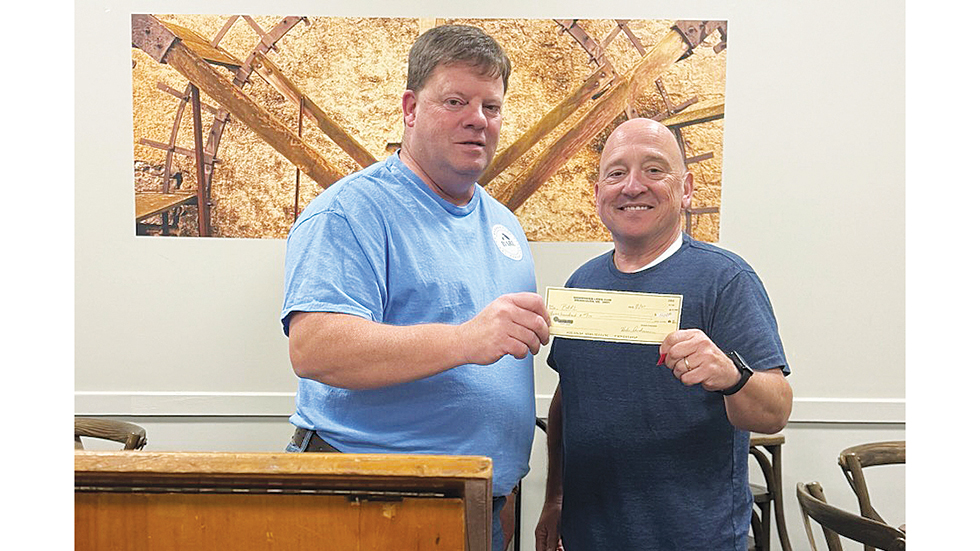Public comments change MDWFP proposed safety rules
Published 6:38 pm Wednesday, June 19, 2024

- Liz Swoope of Baton Rouge shares her thoughts on the MDWFP not passing safety rules to cover federal forest service land. Swoope said she is part of a deer camp in the Homochitto National Forest in Franklin County. (Hunter Cloud | The Daily Leader)
JACKSON — Commissioners approved the removal of references to US Forest Service Lands and Public Use Areas in a proposed rule for basic regulations of Wildlife Management Areas Wednesday. In short, the Mississippi Department of Wildlife, Fisheries and Parks would not be able to enforce safety rules contained in Rule 1.1 on open federal forest land.
Commissioners additionally voted to delete section E from rule 1.1 which would have caused anyone convicted of a regulation violation on WMAs to lose their hunting or fishing privileges for one year. The reason given was the MDWFP has the ability to do so in Mississippi code.
In all, proposed rule 1.1-47 had the phrase “US Forest Service Public Use Area,” 25 times before the removal. The phrase was often used in association with safety rules taken from the USFS Safety Closure Order issued in Mississippi in 2022 and a modified version published in June 2023 which would have aligned WMA and USFS safety rules for enforcement.
Trending
MDWFP Chief of Wildlife Staff Russ Walsh said the proposed rule as written would have allowed already existing rules on WMAs and federal lands to be enforced by MDWFP officers on open forest lands. The rules would have been uniform for open public land users and WMA users in those areas.
Executive Director Lynn Posey announced the change based on a staff recommendation and public comments prior to the meeting’s public comment period opening Wednesday. Posey said the MDWFP received 224 comments on proposed rule 1.1 alone.
“We take those comments very seriously. We think we can do a better job that provides for safety concerns while making the rule clearer for everyone to understand,” Posey said. “Thank you for your participation in this process.”
MDWFP Chief of Law Enforcement Jerry Carter explained the rule change has no impact on what they have been doing. MDWFP officers are unable to enforce federal laws but are there if they come across a violation but can not write a citation on federal land.
Liz Swoope of Baton Rouge drove up to Jackson for the meeting. She told commissioners she is in a Franklin County hunting camp with land in the Homochitto National Forest. Her face reflected feelings of frustration and disappointment as she spoke.
“We think we deserve the same safety protections as the WMA users have,” Swoope said. “Those rules protect people who live in the forest, those who have camps in the forest. It protects the hunters and people who do other types of recreation and the people who travel in the forest.”
Trending
The Homochitto National Forest is spread out over six counties, Franklin, Amite, Adams, Wilkinson, Jefferson, Copiah and Lincoln Counties. Swoope said the USFS has one enforcement officer to work those counties. HNF District Ranger Shaun Williamson confirmed the information Thursday.
She added that if the MDWFP could enforce the rules they would have six officers with five of those being MDWFP officers.
“It is a safety issue and confusing when you have a mishmash of public lands. Somebody said that you felt like you could write better rules. The rules are already there. The USFS has been trying to work with you,” Swoope said. “I’m disappointed our safety is at risk.”
Robert Varner of Winston County echoed Swoope’s concerns with his public comments.
Sen. Joseph Seymour asked the commission why the MDWFP and USFS wanted to impose stricter gun laws on citizens especially when Mississippi is an open carry state. He cited case law and amendments of the US and Mississippi Constitution protecting the right to bear arms.
“It is unconstitutional. If we need more law enforcement in the field we should appropriate more money and try to do more in the future,” Seymour said.
In the end, the safety rules will go to the drawing board and be reworked. Rules relating to fishing creel limits, turkey season, deer bag limits in the Southeastern Deer Management Unit and velvet season opening for open public lands who choose to participate passed.
One rule change which failed was the daily bag limit increase for squirrels to 10 squirrels in fall and spring. Public comments were concerned about the effects on public land. Commissioners voted to keep the fall bag limit at 8 and the spring limit to 4 squirrels.





